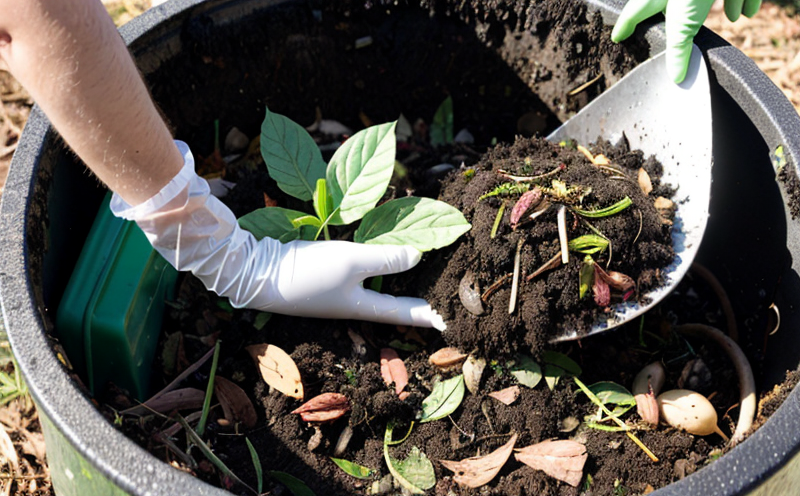ISO 14238 Nitrification Activity Testing in Compost
The ISO 14238 standard is widely recognized as a cornerstone for assessing the nitrification activity of compost. This service specifically evaluates the ability of microorganisms to convert ammonia into nitrite and then to nitrate, which is critical for understanding the stability and maturity of compost materials. Nitrification is a vital process in waste management and composting because it ensures that the compost can support plant growth without releasing harmful levels of ammonia.
The testing procedure outlined in ISO 14238 involves several steps to ensure accurate results. Specimens are prepared by mixing compost samples with controlled amounts of water, ensuring an optimal moisture content for microbial activity. The mixture is then incubated under specific conditions that mimic real-world environments where nitrification takes place.
At the heart of this testing method lies the measurement of ammonia and nitrite levels at different time intervals during the incubation period. This allows us to determine the rate at which nitrification occurs, providing insights into the efficiency and maturity of the compost. The process also involves monitoring temperature, pH, and oxygen availability, as these factors significantly influence microbial activity.
Our laboratory adheres strictly to ISO 14238 guidelines to ensure consistent and reliable results. Our team of experts is well-versed in interpreting these results and providing actionable insights that can help stakeholders make informed decisions about waste management strategies. By understanding the nitrification activity within compost, we can better manage organic waste streams, ensuring they are converted into beneficial resources for agriculture.
In addition to compliance with ISO standards, our service also offers a comprehensive analysis of microbial communities present in the compost. This broader assessment helps us understand not only the nitrification process but also the overall health and maturity of the compost material. Our advanced laboratory equipment allows us to conduct thorough analyses that go beyond simple chemical testing.
The importance of this testing extends far beyond just compliance; it plays a crucial role in sustainable waste management practices. By ensuring proper nitrification, we contribute to reducing environmental impact and promoting circular economy principles. Understanding the microbial activity within compost also helps in optimizing recycling processes and improving soil health.
| Applied Standards |
|---|
| ISO 14238:2015 - Procedure for determining nitrification activity of organic materials intended as compost |
Benefits
The benefits of ISO 14238 Nitrification Activity Testing in Compost are numerous and far-reaching. First and foremost, it ensures that compost produced meets stringent quality standards set by international bodies like ISO. This enhances the credibility and marketability of your product, making it more attractive to buyers who prioritize sustainability.
By conducting this testing, you can identify any deficiencies in your compost production process early on, allowing for corrective actions to be taken promptly. This proactive approach not only improves the quality of your final product but also reduces waste and operational costs associated with reprocessing or scrapping substandard materials.
The insights gained from nitrification activity testing are invaluable for researchers and developers working in the field of organic waste management. It provides a deeper understanding of how different factors such as temperature, pH levels, and moisture content affect microbial activity within compost. This knowledge can be used to refine existing processes or develop new ones that enhance overall efficiency.
Furthermore, this testing contributes significantly towards achieving broader sustainability goals by promoting resource recovery from waste streams. It supports the transition towards circular economies where waste is seen not as a burden but as a valuable resource that can be transformed into something beneficial.
Environmental and Sustainability Contributions
- Reduces methane emissions: Properly managed composting reduces greenhouse gas emissions by converting organic waste into stable humus rather than allowing it to decompose anaerobically, which leads to the production of methane.
- Promotes soil health: Healthy soils are crucial for food security and biodiversity. Compost enriched with effective nitrification activity enhances soil structure, improves water retention capabilities, and promotes beneficial microbial growth.
- Supports circular economy principles: By reusing organic waste materials to produce compost, we minimize landfill use and promote a closed-loop system where resources are continually recycled within the economy.
- Encourages biodiversity: Compost rich in nitrification activity supports diverse ecosystems by providing essential nutrients for plant growth, which in turn fosters greater biodiversity across landscapes.





